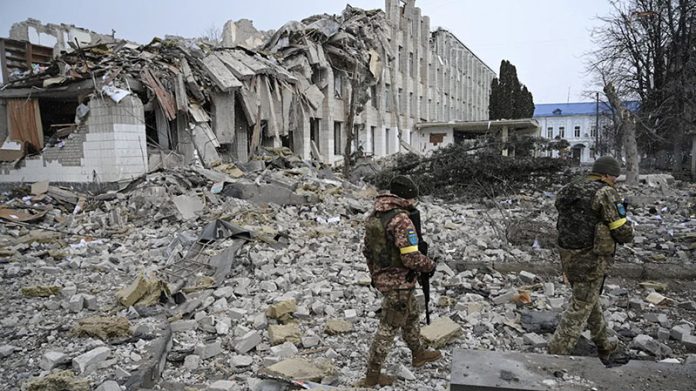By Chloe Riley
In just less than a week, the devastating impact of the conflict in Ukraine on the global economy is already being felt. As a major exporter of commodities, particularly food and energy, Russia had one of the largest economies in the world just a fortnight ago (ranked 11th as per IMF data).
As a result of its widely condemned actions, Russia has been hit with a range of severe sanctions, particularly by western nations, who would rather not face a nuclear opponent on the battlefield. These sanctions have dealt one of the heaviest blows to the Russian economy, causing it to plunge into a deep recession. Some of the sanctions imposed include restricted access to the international payments system SWIFT, the freezing of Russian central bank assets, sanctions against Russian oligarchs and some state-owned banks, and Germany putting a halt to its Russian gas pipeline project.
While the increased prices of gas and oil exports combined with trade conducted with third countries have helped to cushion Russia against the worst of the sanctions, the net economic impact on the Russian economy will be negative. Through our Global Econometric Model (NiGEM), we’ve been able to estimate the following spillover effects to customs brokerage. Due to the war in Ukraine, Russia’s GDP is expected to fall (relative to base) by 1.5 percent in 2022 and 2.6 percent by the end of 2023. Inflation in Russia is expected to spike above 20 percent this year due to higher import prices caused by the rubble’s drop in value and as a result of higher inflation expectations, following weaker real incomes, lower confidence, and in an interruption in trade activities.
In general, we expect the actions taken against Russia to influence a reduction in foreign direct investment, causing an outflow of capital, and decreasing its long-term potential growth rate.
As key players in the global economy, it should go without saying that the economic impact of the Russo-Ukrainian War and the accompanying sanctions will be felt in all parts of the world. According to your analysis, what will be the impact on world GDP and inflation through what channels does this happen?
The war in Ukraine poses a major threat to the global economy, hampering growth and causing a spike in inflation in what is already an existing cost-of-living crisis. While Ukraine isn’t a key trading partner for any of the major economies, Russia is a major export partner for countries such as US, China, Italy, Germany, and France.
There are a number of channels through which the war will affect the global economy. Russia and Ukraine are major exporters of commodities including corn, wheat, palladium, and titanium. Due to the supply chains of these commodities being disrupted, prices are expected to stay high, intensifying for users of such commodities (including smartphone, car, and aircraft makers).
Secondly, with Russia being one of the top three oil producers and energy exporters in the world, the expected drastic increase in energy prices will aggravate the rate of inflation.
Another notable channel through which the world economy will be affected as a result of the war is the strong international economic sanctions on trade with Russia. Keep in mind that these sanctions are far more severe than those placed in Russia in 2014. Our analysis suggests that the price of oil will jump by $40 per barrel.
The massive influx of Ukrainian refugees is another channel through which the world economy will be hampered. According to the UNHCR, we could see up to 4 million refugees as the conflict rages on, and it will be contingent on border controls, how long the conflict continues, and how the economy fairs post-war. Through our analysis, we can predict a net outflow of 2 million a year in 2022 and 2023.
Lastly, increased political risk and uncertainties may ramp up savings ratios and discourage firms from making investments.
Our analysis suggests that the war in Ukraine will cause the level of global GDP to decline by 0.5 percent in 2022, and up to 1 percent by 2023 – translating to about $1 trillion off global GDP. This will lead to a 3 percent increase in global inflation in 2022 and about a 2 percentage points increase in 2023. This would also increase the cost of living and put additional pressure on household consumption.
What and how impactful will the economic effects be on the European Union?
Considering the European Union’s trade links with Russia, reliance on Russian energy for more than 60 percent of its energy requirements, as well as its dependence on Russia for food supplies, the EU is in arguably the most vulnerable position of all major economies.
There has been an increase in risk premia on some European banks and a drop in share prices. Markets will be carefully monitoring any signs of default or liquidity issues for firms with strong ties to Russia.
It is our view that the issue of Ukrainian refugees is primarily a European matter. It brings forth significant demographic challenges, mostly for western Europe and there may be a need for higher public spending to solve these challenges. Additionally, we expect the conflict to drive up NATO’s military spending. The need for additional funds for defense and assistance with the refugee situation is likely to increase pressure on resources and thus inflation.
Through our Global Econometric Model (NiGEM), we are able to predict that Eurozone GDP growth will drop by 0.9 percentage points in 2022 and by 1.5 percentage points in 2023, against our forecast in February. It is also our expectation that inflation will rise to 5.5 percent in 2022 and 2.1 percent in 2023, compared to our February forecasts of 3.1 percent in 2022 and 1.3 percent in 2023.
In the event that sanctions are to be extended to Russian energy exports or Russia starts limiting its gas exports as a means of leverage, energy prices in Europe would skyrocket, thus raising the possibility of a recession as well as much stronger inflation.
Finally, what is to be expected of the UK GDP and inflation?
The UK had a growing trading relationship with Russia. In the wake of the conflict, and as a result of severed financial ties, the UK could see a reduction in GDP growth by around 0.8 percent to 4.0 percent in 2022 and to 0.5 percent in 2023.
Since the UK sources its largest gas supply from Norway and also produces a significant amount of its own gas needs, we expect very few disruptions in supply. However, we do expect the country to be faced with increased wholesale gas prices.
About the Author
Chloe Riley has written on numerous economic matters in the last couple of years. She has a notable interest in geopolitics and cooking


































